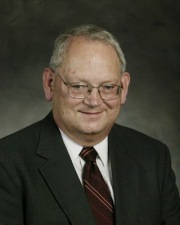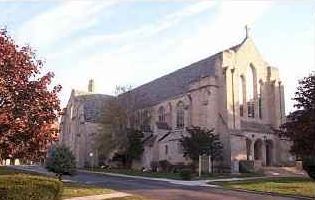Calvert Shenk
|
Calvert Shenk, one of the foremost Catholic musicians in the United States, died on July 9, after a short battle with cancer.
He was serving as Director of Music at Assumption Grotto Church in Detroit, Michigan.
Cal was buried from there on Wednesday, July 13, 2005.
His funeral music and the homily by The Reverend Eduard Perrone are offered here as a tribute to Cal and his wonderful contributions to quality music for the Church.
|

|
The Funeral Mass for Calvert Shenk
July 13, 2005
Assumption Grotto Church
Detroit, Michigan

- Father Eduard Perrone, pastor and celebrant
- Father John Bustamente and Father Eusebius Schwald, concelebrants
- Mary Beth Pardington and Ray Long, choir directors
- Stephanie Nofar and Charles Olegar, organists
Introit — Requiem æternam (chant)
First Reading — Micah 6:1-4, 6-8
Responsorial Psalm — Desiderat anima mea ad te, Deus (chant)
Second Reading — Romans 14:7-12
Gospel — John 14:1-6
After homily — Ora pro nobis (Calvert Shenk)
Offertory — Domine Iesu Christe (chant)
Communion — Lux æterna (chant)
— O sacrum convivium (Calvert Shenk)
— Ave verum (Calvert Shenk)
Final Commendation — Subvenite (chant)
Recessional — Fugue and Toccata on Iste confessor (Calvert Shenk)
Funeral Homily
– Father Eduard Perrone
You have been told, O man, what is good, and what the Lord requires of you: only to do the right and to love goodness, and to walk humbly with your God.
[Micah 6:8 from the first reading of the Mass]
The man of tenacious Catholic faith, the one who steadfastly upholds moral truth, the person who abides unswervingly by principles of creed, by beauty, goodness and charity is a rarity in almost any age.
Compromise and accommodation, indiscriminate tolerance, amnesty, simulation and cunning form the new gospel (cf. Gal 1:8) readily accepted by those who have made the one fundamental and indispensable adjustment that is the gateway to every form of duplicity: self-deception.
It takes a man of steel to be able to withstand today the pressure to capitulate to this proposed alternative way of living, judging and believing.
The counterweight to this enormous assault on human integrity and Christian faith is the irrepressible truth.
One can attempt to hide from it, one can attempt to deny it; one can concoct alternatives to it, but truth itself remains constant and unchanging from age to age.
It is by means of the relentless heckling of conscience (as well as by the profession of the creed) that a man is ever drawn back into reality from which, in his weak moments, he may be tempted to flee.
It is by the inflexible, rigid standard of truth that every man will be judged. "I am truth," said our Lord, [Jn 14:6 from the Gospel of the Mass] and "blessed is he who does not find a stumbling block in me."
I open this funeral sermon in this rather unusual way because death is the supreme moment of truth, the time when the sum of everyone's deeds are weighed and when everything hidden is about to come into full light before the divine tribunal.
"Everyone will have to give an account of himself before God..." [Rom 14:12 from the second reading of the Mass].
The death of someone loved and respected has its way of piercing through artifice, hypocrisy, and self-delusion.
The death and funeral of our dear friend Calvert Shenk prompts the memory of the eternal realities of death, judgment, heaven and hell. Pretense, even if only momentarily, is cast aside, as each one is made to contemplate his own standing before the face of God.
Yet there is another reason for my deliberate emphasis in this sermon on truth.
It is that truth — along with moral goodness and beauty — can yet be found in many persons of good mind and will who employ their reason and faith, their virtue and their talents, in the service of God and humanity.
I have had the occasion to say before in sermons that the Church is replete, even today, with saints — replete, that is, in that even if but a half of one percent of all Catholics today truly aspire to holiness of life, this amounts to mighty legion of God-fearing and upright persons.
This ubiquitous witness of the devout life, which can be found in some persons in most every parish, is due to the fact that the regulating principles of such a life of holiness and goodness are neither abstruse nor inaccessible.
They are rather within the reach of anyone who has fixed his heart on Christ and pledges to live in accordance with the truth.
While the full extent to which our good friend Cal Shenk lived such a life is known to God alone, we have, each one, seen evidences of it in our dealings with him. I will not succumb to the temptation, so prevalent today, to anticipate or usurp the judgment of God.
Rather, I exhort you to pray for the happy repose of Cal's soul and to beseech our Lord to bring him swiftly to heaven.
That would be the right thing to do; that is the Catholic thing to do.
And yet, we have cause to thank God for the gifts and graces He bestowed so generously on Calvert Shenk and which have made us glad to have known him and to have benefited from his life.
For me, a priest with a lifelong involvement in music, I am edified by the way Cal integrated his faith with his talents, his love for his wife and friends with his love for the Church.
If I speak in a more personal way now, it is because Cal last year was devoted to liturgical music in this parish.
As a man, I have always found him decisively Christian.
By that I mean what one ordinarily means about someone who comports himself in a Christian manner.
Practically, this means one who is proved honest and courteous, fair-minded and charitable.
Cal was not one given to fits of bad temper, to harsh words, to unbecoming behavior.
He gave evidence of being loyal to his friends, regular in his religious practices, devoted to his wife, solicitous for his students, and generous.
More than that I should not say lest I err in my office. Your own experiences will supplement for what must remain unsaid here.
But as a church musician, organist, choir director, composer, improviser, teacher I would like to say a few words.
He was himself a student of some distinguished pedagogues, Theodore Marier and David Wilcox among them.
It was for me, and for the whole parish, a great grace, to have had Cal with us this last and —I believe I can say it confidently — happy last year of his life at Assumption Grotto Church.
The occasion of his coming here, while itself regrettable, in retrospect turned into a blessing for us and, according to his own word, for him as well.
It was here that he was able to utilize fully his immense musical gifts in the service of the sacred liturgy.
Although Cal was involved in a broad range of musical activities here (directing, chanting, composing, performing, teaching), yet for me it was in the daily morning Mass that his talents were most remarkably demonstrated.
In how many churches in the world today can one find a fully chanted daily Latin Mass, with over a dozen ordinaries from the Kyriale sung by the people, solemn propers sung by a schola, and — here's the master's unique touch — with marvelous organ improvisations on the chant melodies in an infinite variety of harmonic and coloristic dress?
It was a feat sufficient to impress even the most disinterested listener.
Cal was, simply said, brilliant, and if he was little acknowledged as such, it is because he himself was little aware of it.
Indeed, he appeared to be surprised, even somewhat embarrassed, when I would call attention to some facet of his improvising, or acknowledge his talents.
The fact is that Cal was too little recognized and appreciated: a thing excusable from those who could not discern his abilities, but reprehensible in those who had the position and duty to esteem them.
No problem here at any rate.
Cal once said to me that there was no place he would rather be working than at Assumption Grotto Church.
I can't say how much I treasured those words.
There is one thing more that I wish to speak of in connection with Cal's life's work, and it is something that outlives him.
He has left behind for his students a rich musical legacy of Gregorian chanting and conducting, of organ playing, improvising and directing: practical arts which are rare indeed today.
Cal formed a bridge between church musicians of generations ago with many fortunate church musicians, seminarians and priests of today who were his students.
He communicated to them his love for the sacred liturgy and his devotion to Christ through his music-making and taught them how to carry on in his place.
I have a stronger hope for the Church of the future with the promising pontificate of Pope Benedict, who has been such an assiduous advocate for the restoration of the sacred liturgy, and with the knowledge and expertise in liturgical music that Cal Shenk has left behind him.
Ila, his wife, can be justly proud that his memory and work continue to inspire others to sing more fittingly the praises of God in his temple on earth.
The funeral of a Christian is about the hope of his eternal union with Christ.
We pray that Cal is among those 'nearer the top' of the line of the souls awaiting entry into God's kingdom.
There we hope he soon may be chanting with all his heart in that most distinguished choral society of angels and saints.
To this end, we commend him to the loving intercession of Holy Mary.
By her efficacious prayers, may Cal be made "worthy of the promises of Christ."
The choir immediately sings: "Ora pro nobis," composed by Calvert Shenk and dedicated to Father Eduard Perrone and the Choir of Assumption Grotto Church.
Pray for us, O Holy Mother of God, that we may be made worthy of the promises of Christ.
The music of Cal Shenk in the CNP catalog.
|



